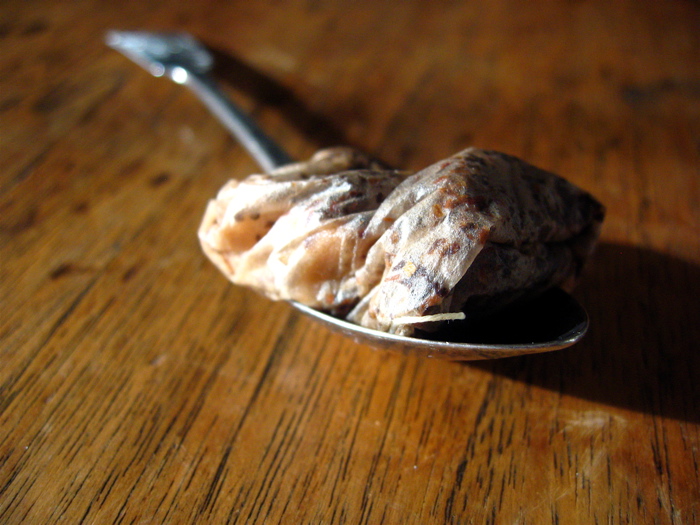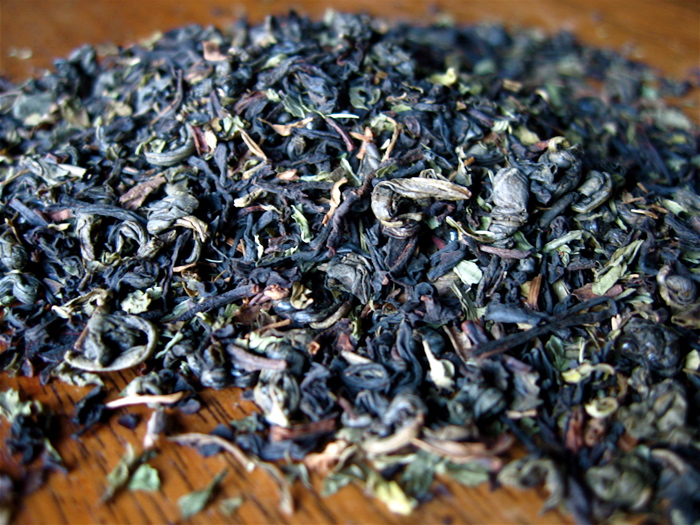
"If need to be known for a medical reason, your physician may contact us in writing."
This is what I was told when I asked the company about their "natural flavors."
Sweet and Spicy Tea and Herb Blend is the name. It comes in a box with a sketch of a man plowing a field with a horse. The trees are billowy, the colors faded -- compelling evidence of its purity. And lest there be doubt, the brand name references goodness and the planet. Oh and it says "natural" on the package.

The tea is an unsweetened black tea with herbs, so logically (I reasoned) the "sweet" was coming from the herbs. I let it steep and cool and then sipped. It was Coca-Cola sweet!!
What was in this herb mixture?!
Rose hips: Not Sweet
Cinnamon: Can be sweet if there is enough
Chamomile: Not Sweet
Lemongrass: Not Sweet
Peppermint: Not Sweet
Papaya: Sweet when in papaya form, but water is not sweet when diffused with it
Jasmine tea: Not Sweet
Anise seed: Sweet but the amount here seemed too small to make it this sweet
Ginger root: Not Sweet
Orange peel: Not Sweet. Have you ever licked the outside of an orange?
Orange oil: Not Sweet
And then I saw it, Natural Flavors. I had glossed over it at first, but natural flavors was actually the very first ingredient listed after black tea (meaning the largest ingredient by volume of all the herbs).
I emailed Good Earth (the brand in my cup) and asked about their flavoring. This is what they said:
"The natural flavoring is a natural cinnamon flavor derived from the oil extractive, part or in whole, and from oil extracts of citrus which could include mandarin orange, orange, tangelo or tangerine. The specific components are proprietary. If need to be known for a medical reason, your physician may contact us in writing with the specific request. There is no MSG or gluten in the blend or flavors used."
The medical reason is that I want to know what's going into my body. I emailed Good Earth back to ask specifically how it was that the tea was so sweet and whether it was the flavors that were making it so.
No response.
For some reason, "flavor" in herbal teas bothers me more than"flavor" in other foods. And "sweet" as flavor bothers me even more than than a specific "food" flavor. My mouth can imagine tasting, say, cinnamon flavor, as it could logically be coming from the cinnamon, but when the flavor is telling my mouth"sweet" and there's nothing sweet there, there is too much of a disconnect between my "sensing" mouth and my "reasoning" brain.

Tea brands that use "natural flavors" (Not all flavors used by these brands are used to make the tea sweet, and not ALL use natural flavors in ALL their teas, but ALL of them use flavors in SOME of their teas. That make sense?)
Allegro
Bigelow (Also uses artificial flavors)
Good Earth
Celestial Seasonings
Choice Organic Teas
Kusmi Tea
Lipton
Mighty Leaf
Salada
Stash
Tazo
Teavana
The Republic of Teas
Tulsi Tea
Twinings
Two Leaves and a Bud
Yogi
Tea brands that don't use "natural flavors" (They don't use flavors in ANY of their teas. The taste is from actual herbs, fruits and oils.)
Numi
Teatulia
Traditional Medicinals
It's lonely in the herb field -- that's because herbs, fruits and (non-tea) leaves, once dried, and infused in a cup of water are often quite bland. Unless it's mint, ginger or pure cinnamon that have some oomph, most are subtle, and unless exceptionally high quality, verge on tasteless. They also lose potency on store shelves, an inconvenient character "defect" not suffered by "flavors."
So why the concern over natural flavors anyway. Because they're not natural. The more natural a food claims to be, the less it usually is. A truly natural food, rarely calls itself "natural," it just calls itself "lemon" or "cinnamon." Moreover, the chemical called "flavor" is virtually identical whether natural or artificial. Banana flavor for example is created by distilling the flavor molecules from a banana using a chemical solvent, while artificial banana flavor is created by mixing chemicals, that result is the identical chemical output.
And what about MSG. To me they're spiritual cousins. Though MSG can be found as a naturally occurring chemical and is naturally present in many foods, when it is listed in ingredients, it is a concentrated additive created in a lab. It is created to enhance flavor in order to create an illusion of something that does not exist. Flavors are created in a lab to add flavor to create an illusion of something that does not exist. The sole purpose of this alchemy is to trick our taste buds -- the food equivalent of sleight of hand, dropped in from the sleeve when the mouth is focused on thinking that the taste is coming from the real thing.
So what to do when you want flavor in your herbal tea without chemicals? This is a tough one. I recently learned that Bengal Spice (a personal favorite) has natural flavors and some of these flavors make it sweet and that giving this up will have serious implications for my afternoons. But I'm going to switch to a pure ginger tea and add some bee-created honey.
What are your thoughts on "flavors" in teas?
For more food learning, come visit The Sweet Beet and enter to win $100 OXO kitchen tool for signing up for emailed posts!